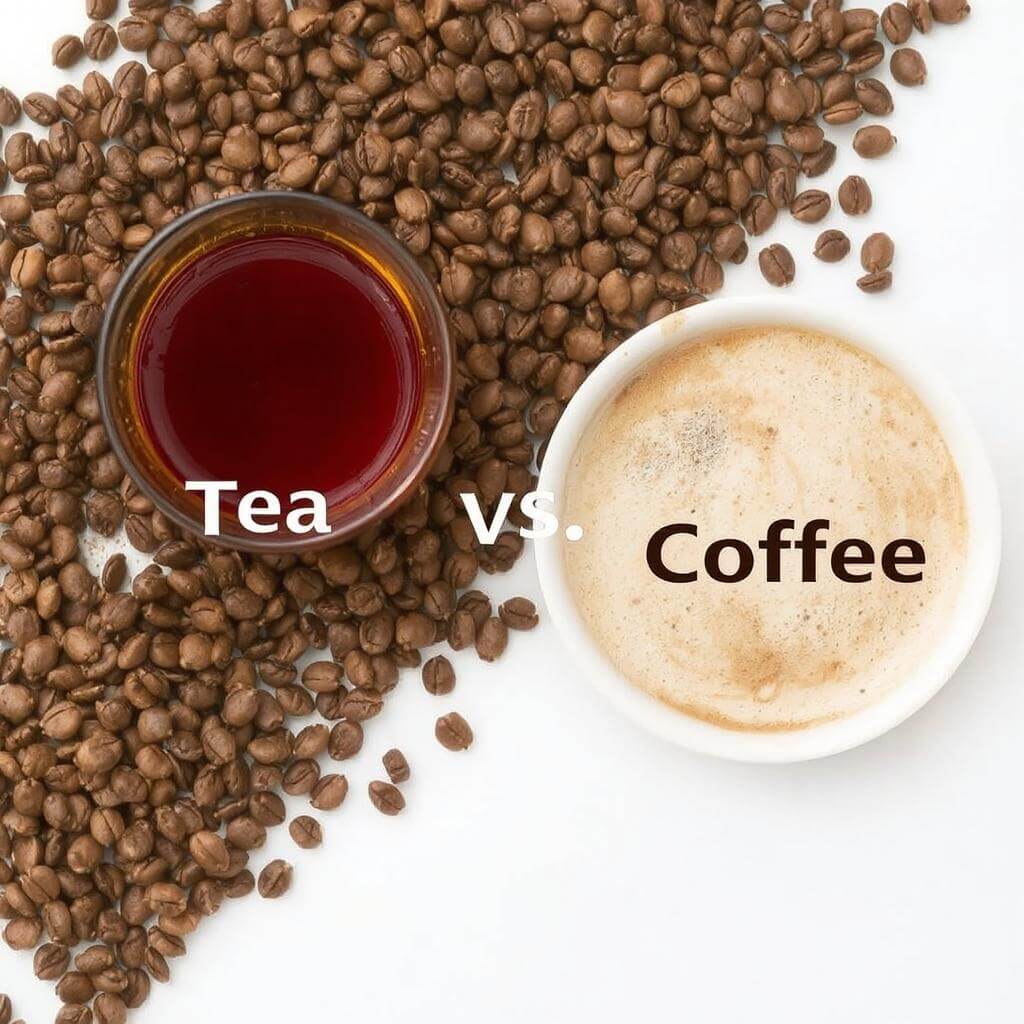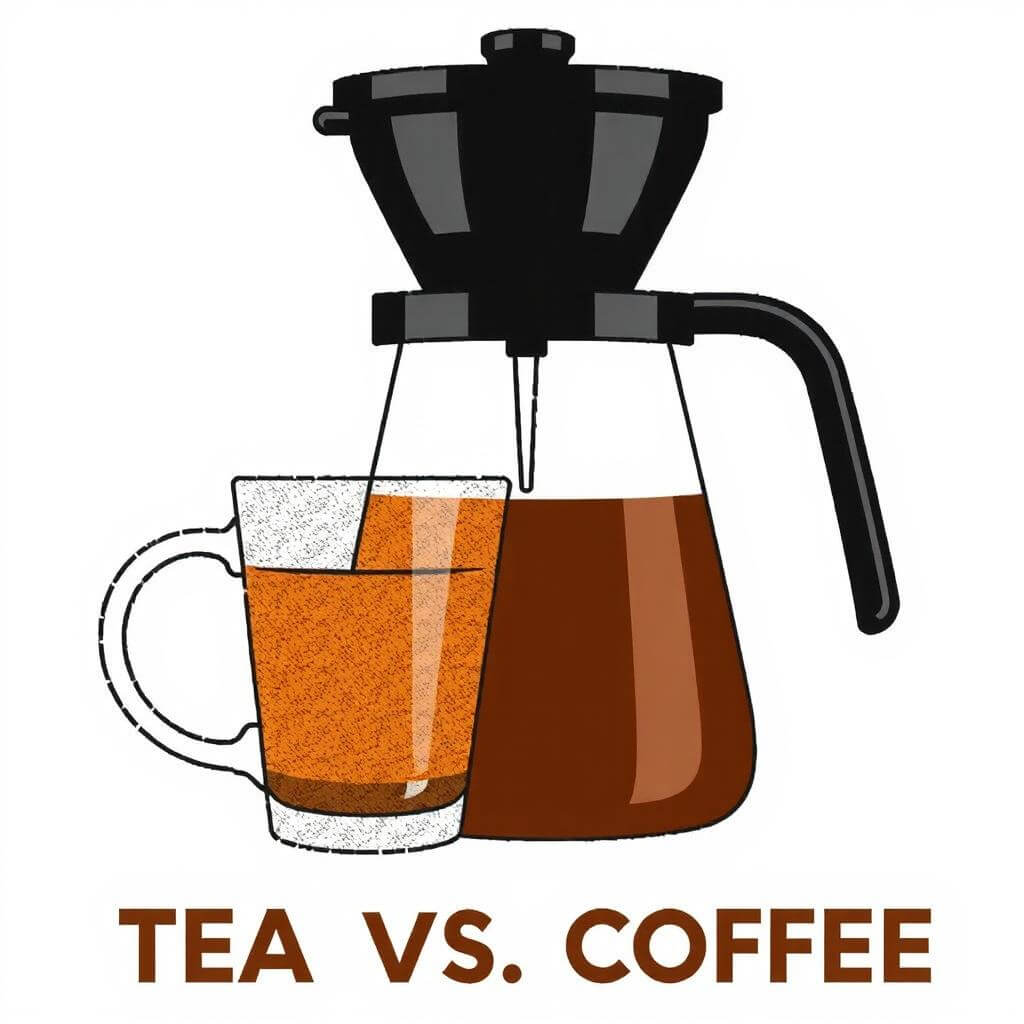Physical Address
304 North Cardinal St.
Dorchester Center, MA 02124
Physical Address
304 North Cardinal St.
Dorchester Center, MA 02124

Discover the health benefits of tea and coffee in this comprehensive guide. Explore how these popular beverages compare in terms of antioxidants, caffeine content, and their effects on energy, heart health, and overall wellness.
In the battle of beverages, few rival the long-standing popularity of tea and coffee. Each drink, steeped in rich history and cultural significance, offers a unique set of health benefits that can greatly enhance our daily lives. As you sip your morning cup, do you ever wonder which one is truly better for your wellness? Understanding the Tea vs. Coffee Health Benefits not only informs your beverage choices but also empowers you to leverage their distinct properties for optimal health.
Tea and coffee are two globally beloved beverages, each with a unique history and culture. Whether it’s a quiet tea ritual or a quick coffee pick-me-up, both drinks offer distinct health benefits. Understanding these benefits can help you choose the drink that best aligns with your wellness goals. From boosting energy to promoting heart health, exploring these two iconic drinks reveals a wealth of potential benefits that can align perfectly with your lifestyle and health goals.

Tea and coffee both provide valuable health benefits thanks to their antioxidant-rich properties, making them essential components of many people’s diets.
Both beverages are also associated with a lower risk of several chronic conditions. Regular consumption of either tea or coffee may contribute to better cardiovascular health, with studies showing that coffee consumption may reduce the risk of liver disease, while tea may support lower blood pressure and cholesterol levels. By incorporating tea or coffee into your daily routine, you can enjoy these health benefits and promote long-term wellness.
The unique compositions of tea and coffee contribute to their specific health benefits. This comparison can offer insight into which drink might best support personal wellness goals.
Coffee and tea have distinct caffeine profiles that impact energy differently. An 8-ounce cup of coffee contains roughly 96 mg of caffeine, compared to black tea’s 47 mg and green tea’s 28 mg. Coffee’s higher caffeine level is responsible for its strong stimulating effect, making it a popular choice for those seeking an immediate energy surge.
In contrast, tea’s lower caffeine levels provide a milder boost, ideal for those looking to avoid caffeine overload. When comparing Tea vs. Coffee Health Benefits for energy, coffee’s caffeine kick can be beneficial for short-term alertness, while tea’s gentler lift offers a sustained, steady feeling of wakefulness without the risk of jitters or a caffeine crash.
Tea and coffee both contain high levels of antioxidants, but their types differ, which affects how they benefit the body. Tea, especially green tea, is rich in polyphenols like catechins and theaflavins. Catechins are known for reducing oxidative stress, an essential factor in preventing cellular damage and inflammation. Theaflavins, specific to black tea, also offer antioxidant and anti-inflammatory effects, making tea a powerful option for those looking to support immune health and reduce inflammation-related ailments.
Coffee’s antioxidant profile, on the other hand, is dominated by chlorogenic acids, which play a role in protecting cardiovascular health and may help regulate blood sugar levels. This makes coffee beneficial for managing metabolic health, especially for those at risk of type 2 diabetes. In terms of Tea vs. Coffee Health Benefits, both drinks offer antioxidant support, with tea providing broader anti-inflammatory benefits and coffee focusing on cardiovascular and metabolic health.
Tea and coffee contain compounds that further distinguish their health benefits. Tea’s L-theanine, an amino acid predominantly found in green tea, is especially valuable for its calming properties. It promotes relaxation and enhances mental clarity, working synergistically with caffeine to create a calm, focused state without drowsiness. This effect is ideal for individuals who want improved concentration without the overstimulation sometimes associated with caffeine. Green tea, in particular, is a popular choice for its balanced energy boost that helps reduce anxiety and improve focus.
Coffee, while lacking L-theanine, has its own set of unique compounds that can enhance athletic performance. These include caffeine itself and other stimulating compounds that improve endurance and physical performance, which is why coffee is often consumed before workouts or other physically demanding activities. When looking at Tea vs. Coffee Health Benefits in this light, tea is an excellent option for mental clarity and relaxation, whereas coffee may be the preferred choice for those needing physical energy and stamina.
While not as significant as the primary active compounds, tea and coffee also contain minerals that contribute to their nutritional value. Tea, for instance, provides small amounts of manganese, potassium, and magnesium, which are essential for bone health, muscle function, and cardiovascular support. Coffee has traces of B vitamins like riboflavin, which supports cell health, and magnesium, which aids in muscle relaxation.
These minerals contribute to a well-rounded nutrient profile in both beverages, though they are present in relatively low quantities. For those considering Tea vs. Coffee Health Benefits with an emphasis on micronutrients, tea’s mineral content may offer slight advantages, especially for long-term bone and heart health.
Beyond antioxidants and caffeine, both beverages impact gut health in different ways. Tea, especially herbal teas like ginger or peppermint, is known for its soothing effects on the digestive system and can be helpful in reducing bloating, indigestion, and even nausea. Green and black teas contain tannins, which have mild antibacterial properties that can aid in balancing gut bacteria.
Coffee, with its acidic properties, can stimulate gastric acid production, helping some people with digestion but potentially causing acid reflux or discomfort in those with sensitive stomachs. In the discussion of Tea vs. Coffee Health Benefits for Digestion, tea generally offers gentler support, while coffee’s impact varies depending on individual tolerance and gastrointestinal health.
Both tea and coffee present a range of unique health benefits thanks to their different compounds and nutrient profiles. When deciding which beverage best suits one’s wellness needs, considering factors like caffeine sensitivity, antioxidant preferences, and any specific health goals, such as energy or digestive support, can be helpful.
For those seeking mental relaxation, tea’s calming L-theanine may be ideal, while coffee’s more immediate caffeine boost and endurance-enhancing compounds make it a good option for physical performance and quick energy. In comparing tea vs. coffee health benefits, both beverages can support a healthy lifestyle in complementary ways, making it possible to enjoy the unique benefits of each depending on individual needs and preferences.benefits of each beverage to fit your lifestyle and wellness needs.

While both tea and coffee provide energy-boosting qualities, they impact wellness in distinct ways:
Both beverages can be part of a healthy, balanced lifestyle when consumed in moderation. Tea vs. Coffee Health Benefits differ depending on individual needs, making each drink advantageous for specific health goals.fits when enjoyed in moderation.
When deciding between tea and coffee, personalization is key to aligning your choice with health, lifestyle, and flavor preferences. Here are several factors that can guide you to the best choice:
For those sensitive to caffeine, understanding the caffeine content and the effects of each drink is critical. Coffee generally contains higher caffeine levels, with about 95 mg per 8-ounce cup, compared to black tea’s approximate 47 mg and green tea’s even lower 28 mg. This makes coffee ideal for those seeking an immediate energy boost, particularly for early morning routines or pre-workout sessions. However, it can also lead to more pronounced caffeine-related effects such as increased heart rate, anxiety, or digestive discomfort, especially in those sensitive to caffeine.
Tea, on the other hand, offers a gentler alternative. Thanks to its lower caffeine levels, tea provides a milder boost that’s less likely to result in jitters. Additionally, many types of tea, particularly green tea, contain L-theanine, an amino acid known for promoting relaxation while enhancing mental clarity. This compound helps moderate caffeine’s stimulating effects, creating a calm focus that may be especially helpful for individuals who want sustained energy without overstimulation.
Personal taste can greatly influence your choice between tea and coffee, and experimenting with different types can help you discover your preferred flavor profiles. Coffee’s robust, bitter flavor appeals to those who enjoy bold, intense tastes. Within coffee, there are various roasts and brewing methods, each impacting the flavor—light roasts tend to be milder and more acidic, while dark roasts have a deeper, richer flavor. Espresso, for instance, offers a concentrated, full-bodied taste, while brewed coffee can vary from smooth and balanced to sharp and tangy.
Tea offers a wider flavor spectrum, from the grassy, slightly bitter notes of green tea to the earthy, smoky flavors of black tea and the floral or spicy profiles of herbal teas. Herbal teas, such as chamomile, peppermint, and rooibos, are naturally caffeine-free, making them an excellent choice for those who want a calming, flavorful beverage at any time of day. For a tea experience closer to coffee, darker teas like pu-erh or oolong offer a richer, more robust flavor, and some teas, like matcha, are prepared with the entire leaf, resulting in a bold, intense taste.
Health needs are another important consideration, especially for those with specific dietary or health concerns. Coffee and tea both contain compounds that can interact with health conditions, so consulting with a healthcare provider can provide valuable insights into which beverage may be more suitable.
For instance, individuals with acid reflux or gastrointestinal sensitivity may find coffee’s acidity triggers symptoms, making tea a gentler alternative. Green tea, in particular, is associated with anti-inflammatory and antioxidant benefits, making it a beneficial choice for those looking to support overall health with a calming beverage.
For people managing conditions like high blood pressure or heart issues, tea may also be the better choice. Studies suggest that certain teas, particularly green and hibiscus teas, can support cardiovascular health and may have a positive effect on blood pressure regulation. Coffee, while also containing heart-healthy antioxidants, should be consumed with moderation by individuals with certain heart conditions due to its stimulating effects on heart rate and blood pressure.
Lastly, individuals on specific diets, such as low-caffeine or plant-based diets, may find certain teas, like herbal varieties, to be more compatible with their restrictions. Similarly, those on a high-antioxidant diet might favor green tea, which is especially rich in catechins, known for their health-protective properties.
These considerations allow for a personalized approach to beverage selection, helping you enjoy the benefits of either tea or coffee according to your health, taste, and lifestyle preferences. Whether you’re drawn to coffee’s bold flavors and energy boost or tea’s gentle stimulation and diverse tastes, exploring the variety within each option can lead to a balanced choice that complements your wellness goals.
The timing of tea or coffee consumption can enhance its benefits:

Both tea and coffee offer wellness benefits, but specific considerations can influence your choice. Here’s how to enjoy these drinks while maximizing the Tea vs. Coffee Health Benefits.
Caffeine levels in tea and coffee can lead to varying effects, especially for those sensitive to stimulants. Coffee, with higher caffeine content, provides an intense energy boost but may cause anxiety, jitters, and sleep disruptions in sensitive individuals. Tea offers a gentler lift in energy due to lower caffeine levels, which may better suit those with caffeine sensitivities. Tea vs. Coffee Health Benefits considerations should include understanding your tolerance. If coffee’s caffeine feels overwhelming, low-caffeine teas like green or white tea are excellent alternatives. Adjusting your intake can allow you to enjoy the benefits of both without the downsides of overstimulation.
Tea vs. Coffee Health Benefits should also consider health conditions that affect how caffeine impacts you. Individuals with anxiety, heart conditions, or acid reflux may find that coffee intensifies symptoms due to its high caffeine and acidity levels. For example, coffee is linked with increased heart rate, and its acidity may exacerbate acid reflux. In such cases, herbal teas like chamomile or rooibos can be excellent options as they contain minimal caffeine and are gentler on the digestive system. Pregnant individuals and those with certain health conditions are generally advised to limit caffeine for safety. In these scenarios, consulting a healthcare provider helps tailor caffeine intake to align with specific health needs.
When exploring Tea vs. Coffee Health Benefits, beverage temperature is a unique consideration. Consuming very hot beverages regularly has been associated with an increased risk of esophageal cancer due to repeated exposure of sensitive tissues to extreme heat. Allowing tea or coffee to cool to a moderate temperature before drinking, ideally below 140°F (60°C), is a simple yet effective measure to reduce potential risks while preserving flavor and health benefits. Opting for warm, rather than piping hot, beverages enables you to safely enjoy both drinks over the long term.
By understanding these considerations, you can tailor your consumption to best capture tea vs. coffee health benefits while reducing health risks. Customizing your tea and coffee intake based on personal sensitivity, health status, and temperature preferences can help you enjoy both drinks as part of a balanced, healthy lifestyle.
Ultimately, the choice between tea and coffee transcends mere preference; it reflects your individual health needs, lifestyle, and tastes. Both beverages offer a multitude of Tea vs. Coffee health benefits, from improving mental clarity and physical performance to providing essential antioxidants that combat chronic diseases. By understanding these differences, you can make an informed decision that enhances your well-being. Whether you lean towards the calming embrace of tea or the invigorating kick of coffee, both drinks can play a valuable role in your daily routine, contributing positively to your health and vitality. Embrace the journey of discovery, and let each sip guide you toward a healthier you.